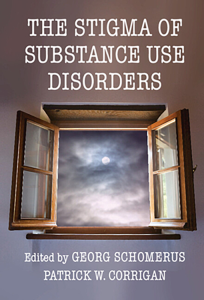Dr. Laura Williamson has studied the ethical issues surrounding public health and how our society views and stigmatizes conditions — specifically addictions — her entire career.

Williamson, director of the Center for Bioethics and Health Policy and an associate professor in the Institute of Public and Preventive Health at Augusta University, contributed her ethics expertise in a chapter in the recently released book The Stigma of Substance Use Disorders by Cambridge University Press.
“Stigma is really important in public health because a number of conditions are undermined by being stigmatized, including diet, obesity and substance use disorders,” Williamson said.
“Substance use disorders (SUDS) and other mental health conditions are particularly heavily negatively stigmatized, and that’s problematic because it can stop people from accessing the treatment that they might need, among other issues. Not all people need treatment for substance use disorders, but those that do find it harder to admit they have a problem because of stigma.”
Stigma can hinder treatment
On top of her contributions to the book, Williamson was recently quoted in an article for Vanity Fair regarding A&E’s longtime docuseries Intervention, where she talked about the importance of informed consent.
“To be able to consent to participate in something, people need to be given information, be able to understand that information and its implications for them, and to decide without external pressure whether to go ahead. This means that for the intervention part of the program to be ethically sound, the participants with the SUDs would need to know about it in advance,” Williamson said.
“While this might be thought by some to make great television, imposing this type of ‘shock’ treatment on a vulnerable group for entertainment purposes is alarming.”

Williamson’s book chapter, “Substance Use Disorders, Stigma, and Ethics,” focuses on SUDs but also dives into lessons learned from public health crises such as the HIV/AIDS epidemic.
According to Williamson’s chapter, “SUDs are among the most stigmatized of health problems. Many issues that influence the stigmatization of SUDs are values-based or ethical in nature; most simply, ethics is concerned with questions of ‘how we should live,’ as individuals and societies. The discrediting of people with SUDs through policies, behaviors, structures, or self-stigma is fundamentally a value-laden enterprise.”
It continues, “Often at the heart of such values-based ethical concerns are public and professional qualms over the responsibility (or perceived irresponsibility) of individuals for their substance use issues. This, in turn, influences questions about whether and to what extent people with SUDs are worthy of resources, time, and, most fundamentally, respect. Such concerns or judgments about people with SUDs can lead to further instances of stigma.”
Williamson outlines the ethics around the stigmatization of SUDs and how it can keep people from getting proper help for their conditions.
“Traditionally, people have thought that one of the ways to overcome stigma is by treating substance use disorders as a disease,” Williamson said. “If we give the public and health professionals information on substance use disorders as a condition, the argument has been that this will help stigma, but we’ve tried that strategy for a very long time now, and it doesn’t work on its own.
“Despite the fact that SUDs have been seen as a disease and as a health condition, it’s still really heavily stigmatized,” Williamson said. “Part of what my chapter does is to argue that there are lots of ethical issues that need to be addressed to help us overcome stigma, and some of those issues are particularly around individual and social responsibility.”
Continued public health research
Williamson, who just completed her second year at AU, is a leading health ethicist specializing in public health and clinical ethics. Her work examines a wide range of issues including vaccination, addiction research, and patient and citizen engagement.
She holds a doctoral degree in philosophy from the University of Liverpool and has extensive experience with issues across the field of health ethics, spanning clinical ethics and public health. This also includes the ethical issues raised by the development of new technologies, like animal-to-human transplantation, the treatment of people with disabilities or impairments and the use and assessment of clinical ethics committees.
Williamson has published two research monographs and a range of peer-reviewed publications in high-ranking journals.
She is currently developing a number of research projects: One is based around the role of ethics education in health care, another is on SUDs responsibility, and the final project aims to study the relationship between trust and public health.
“I’m fascinated by how we do things as a society and the choices we make as individuals,” Williamson said.
“Ethics is an area that allows you to think critically about issues. It’s about critical thinking and good arguments. I think there’s this idea that if we slap a principle on something that we’ve done good ethics, and that isn’t what good ethics is.
“Good ethics is about making sure that you understand factual information of the case and then you unpack and investigate what good arguments are to produce the most sound outcome you can. You’re not looking for right answers; you’re looking for the best answer under the given circumstances.”
 Augusta University
Augusta University




